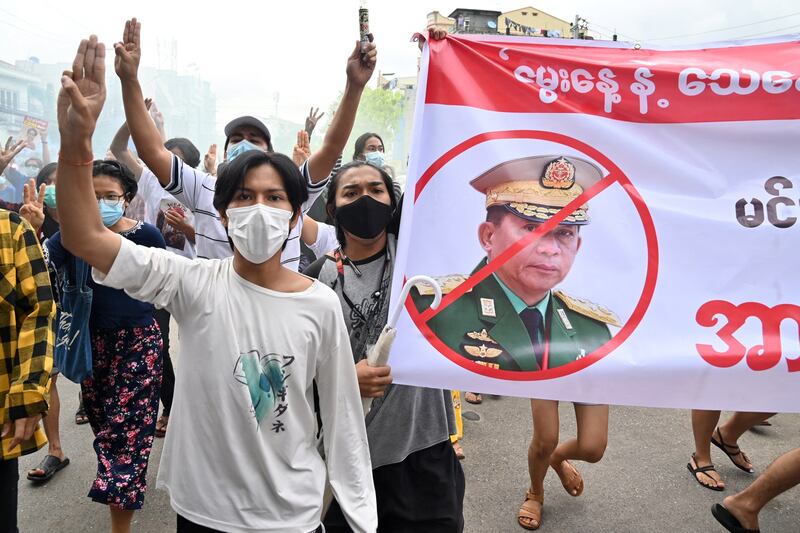Myanmar's junta chief Sr. Gen. Min Aung Hlaing on Sunday declared himself prime minister in a newly formed “caretaker government” and extended military rule through 2023, state media reported on Sunday, six months after he led a coup that ousted the civilian government.
In a state television statement and a speech by Min Aung Hlaing, the military regime extended army control over the country of 54 million people to two-and-a-half years, more than double the one-year emergency the junta announced days after it seized power from Aung San Suu Kyi’s elected government on Feb. 1.
“In order to perform the country’s duties fast, easily and effectively, the state administration council has been re-formed as caretaker government of Myanmar,” a state-run Myawaddy TVpresenter said.
State media quoted Min Aung Hlaing as saying "We will accomplish the provisions of the state of emergency by August 2023,” 18 months after the coup announcement had said democracy would be restored.
"I guarantee the establishment of a union based on democracy and federalism," he added.

The general also said his administration was ready to work with the representative to be named by the Association of Southeast Asian Nations (ASEAN). The 10-nation bloc is expected to finalize a special envoy to deal with the crisis at a virtual meeting this week.
The announcement came exactly six months after the army seized power, alleging that Aun San Su Kyi’s landslide re-election victory in the country’s November 2020 election was the result of extensive voter fraud.
The junta, which has yet to produce evidence of its claims, on July 26 annulled the results of the 2020 election, drawing condemnation from political parties who condemned the move as illegal and said they will not honor it.
Analysts questioned the constitutionality of the newest move by a military regime that has presided over widespread violence and death, and is accused of mishandling the country’s worst COVID-19 outbreak.
“It has been six months since the military coup and they are yet to bring stability in the country,” said Than Soe Naing, a political analyst.
“What's more, everything in the country is going down in all aspects. In their own words, Myanmar is ‘on the verge of falling off a cliff.’”
Min Lwin Oo, a Norway based Human Rights lawyer, told RFA the new arrangement announced on Sunday “is a violation of the Constitution” that was reminiscent of moves army generals took in 1958 when they “abolished everything and formed a new government.”
“There is no provision for forming a caretaker government in the Constitution,” he added.
The junta has violently suppressed mass protests against army rule, arresting at least 5,444 people and killing 940, according to the Bangkok-based Assistance Association for Political Prisoners.
Armed resistance by local People’s Defense Forces in urban and rural areas have killed hundreds of soldiers and police, according to the local fighters and citizen journalist reports.
The coup also dealt a serious blow to efforts to control the spread of COVID-19 in the country, whose healthcare system on the brink of collapse due to a poorly managed third wave of the coronavirus. The number of COVID-19 infections rose Sunday to 299,000, with at least 9,334 deaths.
“Judging by the speech Min Aung Hlaing gave today, the military council has upgraded itself as a civilian administration. This action serves as a road map for a delayed power transfer,” said Aung Myo Min, a rights activist who serves as the shadow National Unity Government (NUG)'s minister for human rights.
“They intend to remain as a government for some time and make the people adapt to the new normal under their rule. They will gradually move toward legalizing themselves as a legitimate government,” he told RFA.
“The other reason they changed themselves to a civilian government is to gain international recognition. They definitely want international recognition,” added Aung Myo Min.
“But they underestimate the truth that changing the appearance or name will not change the people’s opinions nor international legal actions,” he said.
Reported by San San Tin and Nayrein Kyaw for RFA's Myanmar Service. Translated by Ye Kaung Myint Maung and Khet Mar. Written in English by Paul Eckert.
